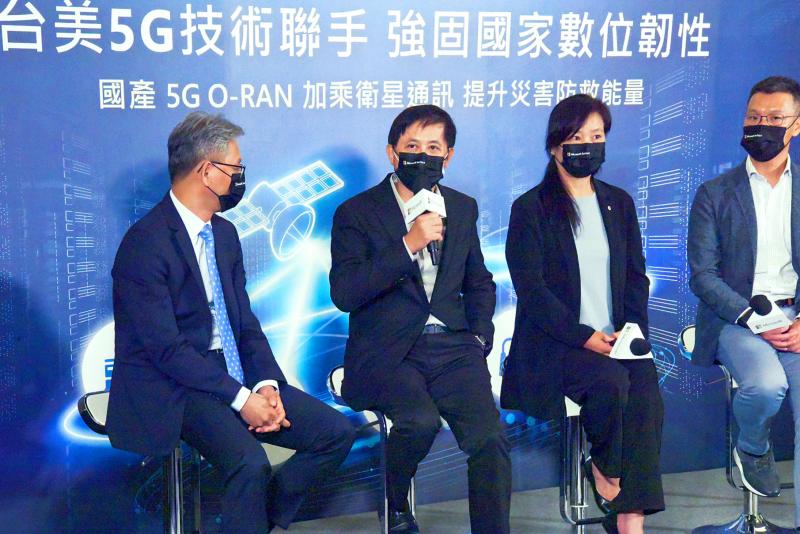iPhone assembly operations in China are beginning to reduce their energy consumption because of a sudden power crunch in the country, which has triggered government-imposed curbs on a range of businesses.
Pegatron Corp (和碩), a key partner for Apple Inc and one of the assemblers of its iPhone, said yesterday that it’s taking energy-saving measures to comply with local government policies.
Regardless, the firms responsible for producing the Apple handset have avoided drastic cutbacks in production so far and appear to be getting preferential access to energy in order to keep operations going, people familiar with the situation said.

Photo courtesy of Pegatron Corp via CNA
Pegatron’s iPhone facility in the eastern city of Kunshan will be only modestly affected, two of the sources said, asking not to be named because the information is not public.
There has been no major impact on the nearby Luxshare Precision Industry Co (立訊精密) iPhone assembly unit, and the company continues to ready key products for shipment in line with its original schedule, one of the people said.
Curbs on industrial energy use have been imposed across several provinces, including economic powerhouses Jiangsu and Guangdong, as Chinese officials pursue Chinese President Xi Jinping’s (習近平) carbon-neutral push and react to escalating coal and gas prices.
The continued operations of Apple suppliers suggest that Beijing might be giving exceptions to the advanced manufacturing sector from its power sanctions.
Pegatron’s iPhone production facility in Shanghai and Hon Hai Precision Industry Co’s (鴻海精密) key Apple handset manufacturing base in Zhengzhou — known as iPhone City — have continued uninterrupted, several of the sources said.
Pegatron has been adopting measures to save water and energy over the past few years, “and there is a comprehensive response program for the current situation to reduce the impact on our operations and production capacity,” the company said in a texted statement.
While the iPhone supply chain appears resilient for now, executives at major Apple suppliers are closely monitoring developments, according to the sources.
Exports remain a key growth driver for China, with Hon Hai and other tech hardware manufacturers being the country’s top exporters and among its biggest employers.

TAKING STOCK: A Taiwanese cookware firm in Vietnam urged customers to assess inventory or place orders early so shipments can reach the US while tariffs are paused Taiwanese businesses in Vietnam are exploring alternatives after the White House imposed a 46 percent import duty on Vietnamese goods, following US President Donald Trump’s announcement of “reciprocal” tariffs on the US’ trading partners. Lo Shih-liang (羅世良), chairman of Brico Industry Co (裕茂工業), a Taiwanese company that manufactures cast iron cookware and stove components in Vietnam, said that more than 40 percent of his business was tied to the US market, describing the constant US policy shifts as an emotional roller coaster. “I work during the day and stay up all night watching the news. I’ve been following US news until 3am

UNCERTAINTY: Innolux activated a stringent supply chain management mechanism, as it did during the COVID-19 pandemic, to ensure optimal inventory levels for customers Flat-panel display makers AUO Corp (友達) and Innolux Corp (群創) yesterday said that about 12 to 20 percent of their display business is at risk of potential US tariffs and that they would relocate production or shipment destinations to mitigate the levies’ effects. US tariffs would have a direct impact of US$200 million on AUO’s revenue, company chairman Paul Peng (彭雙浪) told reporters on the sidelines of the Touch Taiwan trade show in Taipei yesterday. That would make up about 12 percent of the company’s overall revenue. To cope with the tariff uncertainty, AUO plans to allocate its production to manufacturing facilities in

Six years ago, LVMH’s billionaire CEO Bernard Arnault and US President Donald Trump cut the blue ribbon on a factory in rural Texas that would make designer handbags for Louis Vuitton, one of the world’s best-known luxury brands. However, since the high-profile opening, the factory has faced a host of problems limiting production, 11 former Louis Vuitton employees said. The site has consistently ranked among the worst-performing for Louis Vuitton globally, “significantly” underperforming other facilities, said three former Louis Vuitton workers and a senior industry source, who cited internal rankings shared with staff. The plant’s problems — which have not

COLLABORATION: Given Taiwan’s key position in global supply chains, the US firm is discussing strategies with local partners and clients to deal with global uncertainties Advanced Micro Devices Inc (AMD) yesterday said it is meeting with local ecosystem partners, including Taiwan Semiconductor Manufacturing Co (TSMC, 台積電), to discuss strategies, including long-term manufacturing, to navigate uncertainties such as US tariffs, as Taiwan occupies an important position in global supply chains. AMD chief executive officer Lisa Su (蘇姿丰) told reporters that Taiwan is an important part of the chip designer’s ecosystem and she is discussing with partners and customers in Taiwan to forge strong collaborations on different areas during this critical period. AMD has just become the first artificial-intelligence (AI) server chip customer of TSMC to utilize its advanced